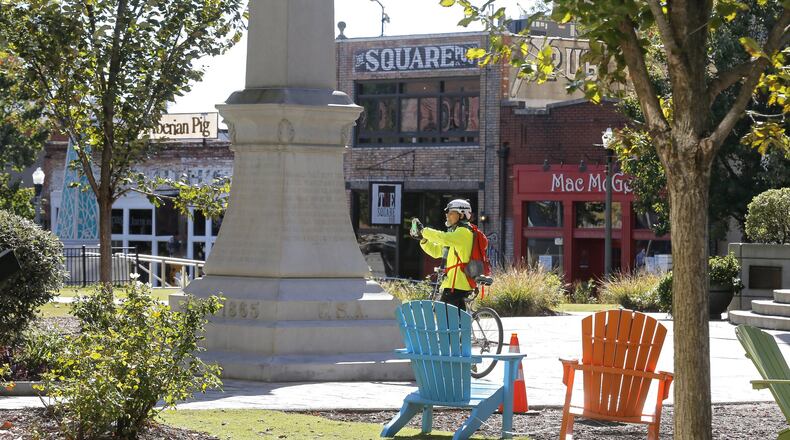An Atlanta lawmaker is questioning the legality of the recent removal of a convicted former Henry County commissioner’s name from plaques on public buildings that were constructed while he was in office.
State Sen. Elena Parent, D-Atlanta, said she believes the county is violating a new state law that adds protections for Georgia's monuments and markers.
Senate Bill 77 also places further limits on where a local government can move a monument — requiring it to be placed in a "site of similar prominence."
It imposes stiffer penalties on vandals of monuments, requiring those convicted to pay up to three times the cost of the damage, as well as legal fees and expenses for the repair or replacement of a monument.
The law includes a variety of displays in the definition of “monument,” including a plaque or structure that is dedicated to a historic entity or historically significant event.
Parent, a lawyer, said that opening new public buildings is a “fusion of community and political significance” and falls within the definition of monuments.
Henry County officials recently decided to remove the name of former Commissioner Gary Freedman from plaques on several buildings in the county. The plaques list all the commissioners that were on the board at the time a building was dedicated.
Freedman pleaded guilty to child molestation charges in 2017. He served on the county's Board of Commissioners for eight years and lost a bid for chairman in 2004.
County spokeswoman Melissa Robinson said the Facilities Maintenance Department began altering the plaques “near the end of April” and completed the work May 9. Gov. Brian Kemp signed the bill into law April 26, and it went into effect that day.
“The plaques on buildings from which Gary Freedman’s name was removed are not the types of historical displays covered by the recent historical markers law,” Robinson said. “Crimes against children are the most heinous of crimes, and we felt strongly that the county wanted to distance themselves from that.”
State Rep. Alan Powell, R-Hartwell, who ushered the legislation through the House, said it was difficult to say whether Henry County violated the law.
“I’d have to think through it,” he said. “It sounds like someone down there is playing politics, but I don’t know whether that plaque would be considered a monument rather than just an identifier to a public building.”
The bill's sponsor, Chickamauga Republican state Sen. Jeff Mullis, did not respond to a request for comment.
During the legislative session, Mullis said the bill's intent was to protect all monuments. He filed the legislation a few days after vandals splashed deep red paint on a 30-foot obelisk praising Confederate soldiers in downtown Decatur — a monument DeKalb County has tried to remove or relocate for years.
The monument glorifies the Confederacy and says its soldiers "were of a covenant keeping race." A 2001 state law prohibits such monuments from being "relocated, removed, concealed, obscured, or altered in any fashion."
For the past few years, Parent and other Democratic lawmakers have introduced legislation that would allow local governments to remove or relocate polarizing Confederate monuments. Those efforts have gone nowhere.
While the new law was being debated, Mullis said he didn’t believe people should change monuments they disagree with, but should instead add something that gives context.
That’s what DeKalb County commissioners have decided to do.
In March, commissioners approved placing a marker next to the obelisk that will identify it as a symbol of racism and white supremacy.
The commission is in the process of approving the wording for the cast-metal marker. The county has budgeted $3,000 for the project.
DeKalb County Commissioner Kathie Gannon said the marker will serve as a “teaching moment.”
“We also want to take advantage of new opportunities to display memorials and statues that are keeping with how our broader community feels in current times,” she said.
Gannon said the county's recent decision to partner with the DeKalb NAACP to erect a lynching marker outside the courthouse is an example. Officials are also working to claim a replica of a DeKalb County marker that is on display at the National Memorial for Peace and Justice in Montgomery, Ala.
The Montgomery museum features 800 steel monuments, one for every U.S. county where a lynching occurred. There is a copy of each 6-foot, coffin-shaped module lying in a field surrounding the museum awaiting counties to claim them.
DeKalb CEO Michael Thurmond has asked the Georgia Historical Society to inventory every monument and marker in the county, Confederate or otherwise. The end result will be a report that not only identifies what is present but also the gaps that create an incomplete retelling of the county’s history, he said.
More markers and monuments could be added in the future to fill in the blanks.
“We need to look comprehensively at what story are the markers telling and are they truly telling the story of a diverse county with a truly diverse history,” he said.
Stay on top of what’s happening in Georgia government and politics at www.ajc.com/politics.
Keep Reading
The Latest
Featured





